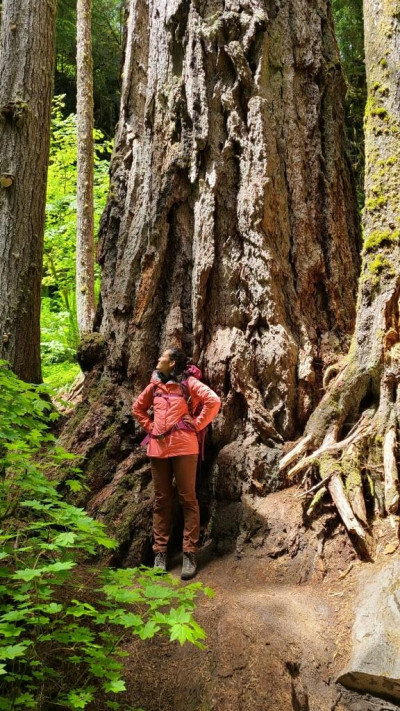Biology Student Explores the Forests of the Future

Pruiett’s efforts are the product of her ten-week summer fellowship with the American Conifer Society. A biology major from Yakima, Washington, Pruiett is hardly a novice when it comes to scavenging for ecological data. One of her first college courses was Investigations in Ecology and Environmental Science with Associate Professor of Biology Margaret Metz, who would later become Pruiett’s academic advisor and research mentor.
“For the first time I realized there was more to biology than just cells,” Pruiett says. “I fell in love with the idea that you can study really large phenomena that drive the shape of landscapes and the shape of the world.”
By the second semester of her first year, Pruiett was working in Metz’s lab and studying the ways in which pathogens can affect the diversity of seedling generation in old-growth forests. This prior research, funded by the National Science Foundation (NSF), laid the groundwork for Pruiett’s current project, which will become the subject of her senior honors thesis in the fall, guided by the mentorship of Sr. Professor of Natural Sciences Paulette Bierzychudek.
With aid from the John S. Rogers Science Foundation, Pruiett is now looking at the species composition of trees in urban and rural parks to investigate whether there is a difference in regeneration.
“It’s been established that urban forests have fewer young trees than rural forests,” Pruiett explains. “But it’s unknown why that is.”
Seedling trees are less than an inch tall, but they hold a mirror to what the forest will look like in generations to come. By focusing on the way that nurse logs – which feed and nurture seedling trees – may provide a more moist substrate for germinating seeds, Pruiett will be able to see if adding down wood to urban forests could aid regeneration.
“Even if I don’t come up with a yes or no, it’s the process of going out and working every day and putting so much thought and energy into it,” she says. “I’m excited for the answers.”
For Pruiett, part of the thrill comes from the prospect of distilling her findings for a non-scientific audience.
“We’re the evergreen state. This decreased regeneration could change the species composition of our iconic conifer parks,” she says. “It’s been cool to think about the way that we as scientists engage with the community and how we can make it as interesting and accessible to as many people as possible.”
More Stories

National Award
Finn Watson BA ’26 Wins Goldwater Scholarship
Watson is one of 441 students selected from a pool of more than 5,000 nationwide for the Barry Goldwater Scholarship, the preeminent award for undergraduates in the natural sciences, engineering, and mathematics.

New Leadership
Andrew Saultz Selected Dean of the Graduate School
Andrew Saultz, an alumnus of L&C’s Master of Arts in Teaching program, begins his tenure on August 4.

Stronger Together
Lewis & Clark and Albina Vision Trust Launch Historic Partnership
The new collaboration will build a hub for education and economic opportunity within Portland’s redeveloped Lower Albina district to foster learning as a core value of the community and provide opportunities for Albina residents and Lewis & Clark students, staff, and faculty.

Big Winners
Speech and Debate Shines at National Tournaments
Lewis & Clark’s speech and debate program won a pair of championships at recent national tournaments. The team of Maltin Tocani BA ’25 and Isabella Moore BA ’26 won the Honors division at the YODL national British Parliamentary debate championships, while the Lewis & Clark contingent at the National Speech Tournament won the team title in the limited entry category.
